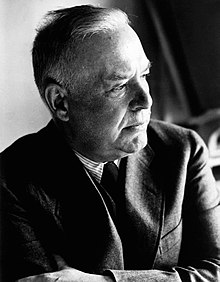
Back ولاس ستيفنز Arabic ولاس ستيفنز ARZ والاس استیونز AZB Уолес Стывенс Byelorussian Уолъс Стивънс Bulgarian Wallace Stevens Catalan Wallace Stevens Czech Wallace Stevens Danish Wallace Stevens German Γουάλας Στίβενς Greek
Wallace Stevens | |
|---|---|
 Stevens in 1948 | |
| Born | October 2, 1879 Reading, Pennsylvania, U.S. |
| Died | August 2, 1955 (aged 75) Hartford, Connecticut, U.S. |
| Occupation |
|
| Education | Harvard University New York Law School (LLB) |
| Period | 1914–1955 |
| Literary movement | Modernism |
| Notable works | Harmonium The Idea of Order at Key West The Man with the Blue Guitar The Auroras of Autumn Of Modern Poetry |
| Notable awards | Robert Frost Medal (1951) |
| Spouse |
Elsie Kachel (m. 1909) |
| Children | 1 |
| Signature | |
Wallace Stevens (October 2, 1879 – August 2, 1955) was an American modernist poet. He was born in Reading, Pennsylvania, educated at Harvard and then New York Law School, and spent most of his life working as an executive for an insurance company in Hartford, Connecticut.
Stevens's first period begins with the publication of Harmonium (1923), followed by a slightly revised and amended second edition in 1930. It features, among other poems, "The Emperor of Ice-Cream", "Sunday Morning", "The Snow Man", and "Thirteen Ways of Looking at a Blackbird".[1] His second period commenced with Ideas of Order (1933), included in Transport to Summer (1947). His third and final period began with the publication of The Auroras of Autumn (1950), followed by The Necessary Angel: Essays On Reality and the Imagination (1951).
Many of Stevens's poems, like "Anecdote of the Jar", "The Man With the Blue Guitar", "The Idea of Order at Key West", "Of Modern Poetry" and "Notes Towards a Supreme Fiction", deal with the art of making art and poetry in particular. His Collected Poems (1954) won the Pulitzer Prize for Poetry in 1955.[1]
© MMXXIII Rich X Search. We shall prevail. All rights reserved. Rich X Search